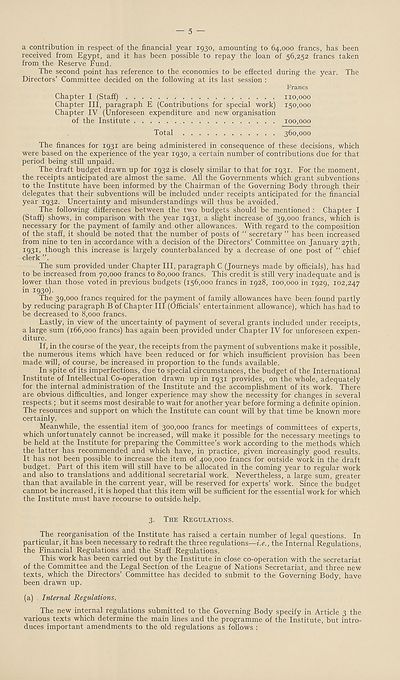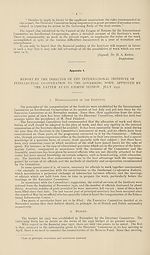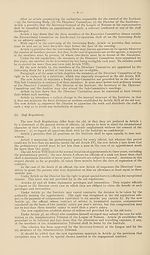International > Report of the Governing body of the International Institute of Intellectual Co-operation > 1931
(5)
Download files
Complete book:
Individual page:
Thumbnail gallery: Grid view | List view

5
a contribution in respect of the financial year 1930, amounting to 64,000 francs, has been
received from Egypt, and it has been possible to repay the loan of =56,2^2 francs taken
from the Reserve Fund.
The second point has reference to the economies to be effected during the year. The
Directors’ Committee decided on the following at its last session :
Francs
Chapter I (Staff) 110,000
Chapter III, paragraph E (Contributions for special work) 150,000
Chapter IV (Unforeseen expenditure and new organisation
of the Institute 100,000
Total 360,000
The finances for 1931 are being administered in consequence of these decisions, which
were based on the experience of the year 1930, a certain number of contributions due for that
period being still unpaid.
The draft budget drawn up for 1932 is closely similar to that for 1931. For the moment,
the receipts anticipated are almost the same. All the Governments which grant subventions
to the Institute have been informed by the Chairman of the Governing Body through their
delegates that their subventions will be included under receipts anticipated for the financial
year 1932. Uncertainty and misunderstandings will thus be avoided.
The following differences between the two budgets should be mentioned : Chapter I
(Staff) shows, in comparison with the year 1931, a slight increase of 39,000 francs, which is
necessary for the payment of family and other allowances. With regard to the composition
of the staff, it should be noted that the number of posts of “ secretary ” has been increased
from nine to ten in accordance with a decision of the Directors’ Committee on January 27th,
1931, though this increase is largely counterbalanced by a decrease of one post of “ chief
clerk
The sum provided under Chapter III, paragraph C (Journeys made by officials), has had
to be increased from 70,000 francs to 80,000 francs. This credit is still very inadequate and is
lower than those voted in previous budgets (156,000 francs in 1928, 100,000 in 1929, 102,247
in 1930).
The 39,000 francs required for the payment of family allowances have been found partly
by reducing paragraph B of Chapter III (Officials’ entertainment allowance), which has had to
be decreased to 8,000 francs.
Lastly, in view of the uncertainty of payment of several grants included under receipts,
a large sum (166,000 francs) has again been provided under Chapter IV for unforeseen expen¬
diture.
If, in the course of the year, the receipts from the payment of subventions make it possible,
the numerous items which have been reduced or for which insufficient provision has been
made will, of course, be increased in proportion to the funds available.
In spite of its imperfections, due to special circumstances, the budget of the International
Institute of Intellectual Co-operation drawn up in 1931 provides, on the whole, adequately
for the internal administration of the Institute and the accomplishment of its work. There
are obvious difficulties, and longer experience may show the necessity for changes in several
respects ; but it seems most desirable to wait for another year before forming a definite opinion.
The resources and support on which the Institute can count will by that time be known more
certainly.
Meanwhile, the essential item of 300,000 francs for meetings of committees of experts,
which unfortunately cannot be increased, will make it possible for the necessary meetings to
be held at the Institute for preparing the Committee’s work according to the methods which
the latter has recommended and which have, in practice, given increasingly good results.
It has not been possible to increase the item of 400,000 francs for outside work in the draft
budget. Part of this item will still have to be allocated in the coming year to regular work
and also to translations and additional secretarial work. Nevertheless, a large sum, greater
than that available in the current year, will be reserved for experts’ work. Since the budget
cannot be increased, it is hoped that this item will be sufficient for the essential work for which
the Institute must have recourse to outside.help.
3. The Regulations.
The reorganisation of the Institute has raised a certain number of legal questions. In
particular, it has been necessary to redraft the three regulations—i.e., the Internal Regulations,
the Financial Regulations and the Staff Regulations.
This work has been carried out by the Institute in close co-operation with the secretariat
of the Committee and the Legal Section of the League of Nations Secretariat, and three new
texts, which the Directors’ Committee has decided to submit to the Governing Body, have
been drawn up.
(a) Internal Regulations.
The new internal regulations submitted to the Governing Body specify in Article 3 the
various texts which determine the main lines and the programme of the Institute, but intro¬
duces important amendments to the old regulations as follows :
a contribution in respect of the financial year 1930, amounting to 64,000 francs, has been
received from Egypt, and it has been possible to repay the loan of =56,2^2 francs taken
from the Reserve Fund.
The second point has reference to the economies to be effected during the year. The
Directors’ Committee decided on the following at its last session :
Francs
Chapter I (Staff) 110,000
Chapter III, paragraph E (Contributions for special work) 150,000
Chapter IV (Unforeseen expenditure and new organisation
of the Institute 100,000
Total 360,000
The finances for 1931 are being administered in consequence of these decisions, which
were based on the experience of the year 1930, a certain number of contributions due for that
period being still unpaid.
The draft budget drawn up for 1932 is closely similar to that for 1931. For the moment,
the receipts anticipated are almost the same. All the Governments which grant subventions
to the Institute have been informed by the Chairman of the Governing Body through their
delegates that their subventions will be included under receipts anticipated for the financial
year 1932. Uncertainty and misunderstandings will thus be avoided.
The following differences between the two budgets should be mentioned : Chapter I
(Staff) shows, in comparison with the year 1931, a slight increase of 39,000 francs, which is
necessary for the payment of family and other allowances. With regard to the composition
of the staff, it should be noted that the number of posts of “ secretary ” has been increased
from nine to ten in accordance with a decision of the Directors’ Committee on January 27th,
1931, though this increase is largely counterbalanced by a decrease of one post of “ chief
clerk
The sum provided under Chapter III, paragraph C (Journeys made by officials), has had
to be increased from 70,000 francs to 80,000 francs. This credit is still very inadequate and is
lower than those voted in previous budgets (156,000 francs in 1928, 100,000 in 1929, 102,247
in 1930).
The 39,000 francs required for the payment of family allowances have been found partly
by reducing paragraph B of Chapter III (Officials’ entertainment allowance), which has had to
be decreased to 8,000 francs.
Lastly, in view of the uncertainty of payment of several grants included under receipts,
a large sum (166,000 francs) has again been provided under Chapter IV for unforeseen expen¬
diture.
If, in the course of the year, the receipts from the payment of subventions make it possible,
the numerous items which have been reduced or for which insufficient provision has been
made will, of course, be increased in proportion to the funds available.
In spite of its imperfections, due to special circumstances, the budget of the International
Institute of Intellectual Co-operation drawn up in 1931 provides, on the whole, adequately
for the internal administration of the Institute and the accomplishment of its work. There
are obvious difficulties, and longer experience may show the necessity for changes in several
respects ; but it seems most desirable to wait for another year before forming a definite opinion.
The resources and support on which the Institute can count will by that time be known more
certainly.
Meanwhile, the essential item of 300,000 francs for meetings of committees of experts,
which unfortunately cannot be increased, will make it possible for the necessary meetings to
be held at the Institute for preparing the Committee’s work according to the methods which
the latter has recommended and which have, in practice, given increasingly good results.
It has not been possible to increase the item of 400,000 francs for outside work in the draft
budget. Part of this item will still have to be allocated in the coming year to regular work
and also to translations and additional secretarial work. Nevertheless, a large sum, greater
than that available in the current year, will be reserved for experts’ work. Since the budget
cannot be increased, it is hoped that this item will be sufficient for the essential work for which
the Institute must have recourse to outside.help.
3. The Regulations.
The reorganisation of the Institute has raised a certain number of legal questions. In
particular, it has been necessary to redraft the three regulations—i.e., the Internal Regulations,
the Financial Regulations and the Staff Regulations.
This work has been carried out by the Institute in close co-operation with the secretariat
of the Committee and the Legal Section of the League of Nations Secretariat, and three new
texts, which the Directors’ Committee has decided to submit to the Governing Body, have
been drawn up.
(a) Internal Regulations.
The new internal regulations submitted to the Governing Body specify in Article 3 the
various texts which determine the main lines and the programme of the Institute, but intro¬
duces important amendments to the old regulations as follows :
Set display mode to:
![]() Universal Viewer |
Universal Viewer | ![]() Mirador |
Large image | Transcription
Mirador |
Large image | Transcription
Images and transcriptions on this page, including medium image downloads, may be used under the Creative Commons Attribution 4.0 International Licence unless otherwise stated. ![]()
| League of Nations > International > Report of the Governing body of the International Institute of Intellectual Co-operation > 1931 > (5) |
|---|
| Permanent URL | https://digital.nls.uk/195306409 |
|---|
| Attribution and copyright: |
|
|---|---|
| Shelfmark | LN.XII.3 |
|---|---|
| Shelfmark | LN.XII |
|---|
| Description | Over 1,200 documents from the non-political organs of the League of Nations that dealt with health, disarmament, economic and financial matters for the duration of the League (1919-1945). Also online are statistical bulletins, essential facts, and an overview of the League by the first Secretary General, Sir Eric Drummond. These items are part of the Official Publications collection at the National Library of Scotland. |
|---|---|
| Additional NLS resources: |
|

